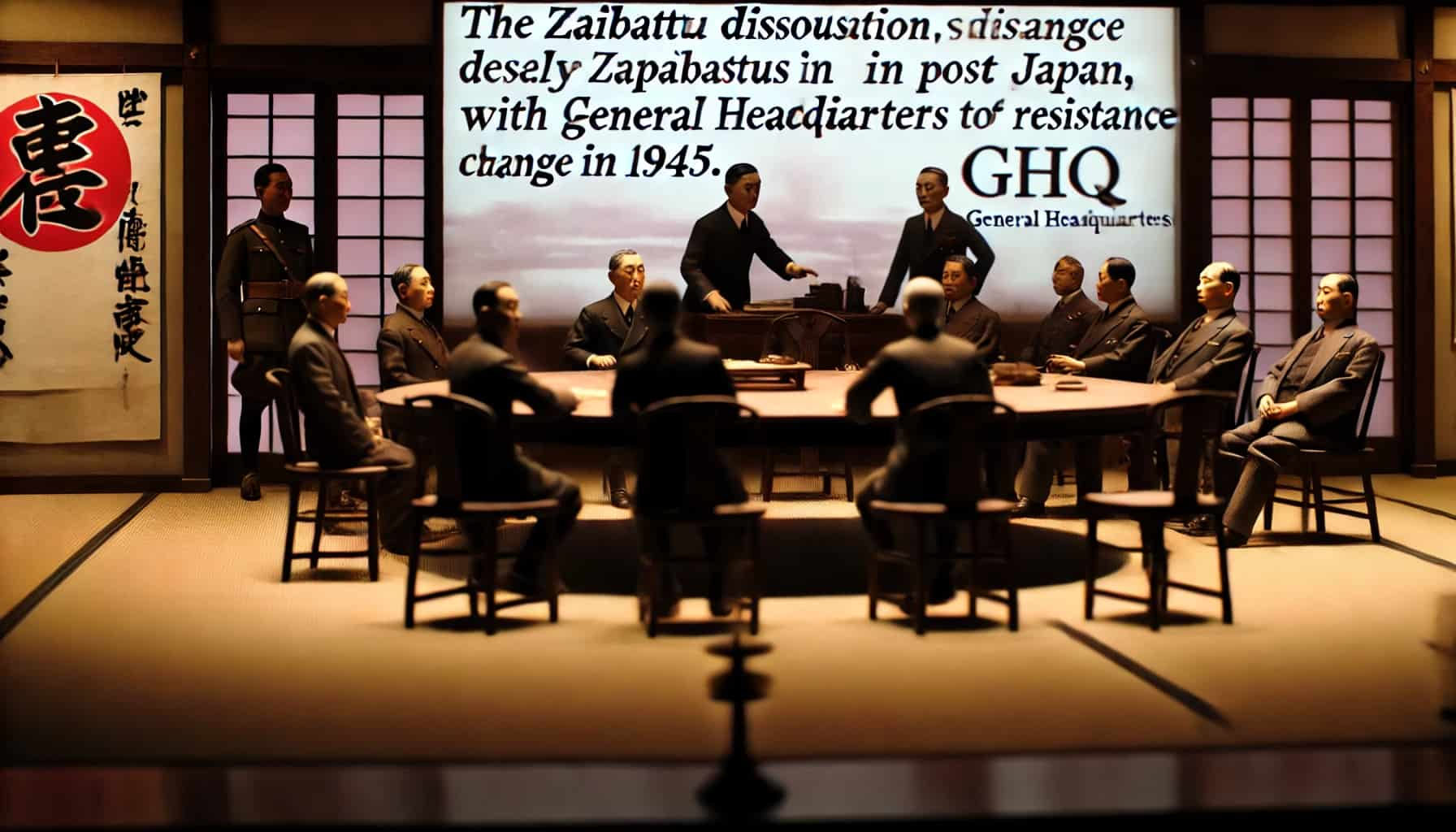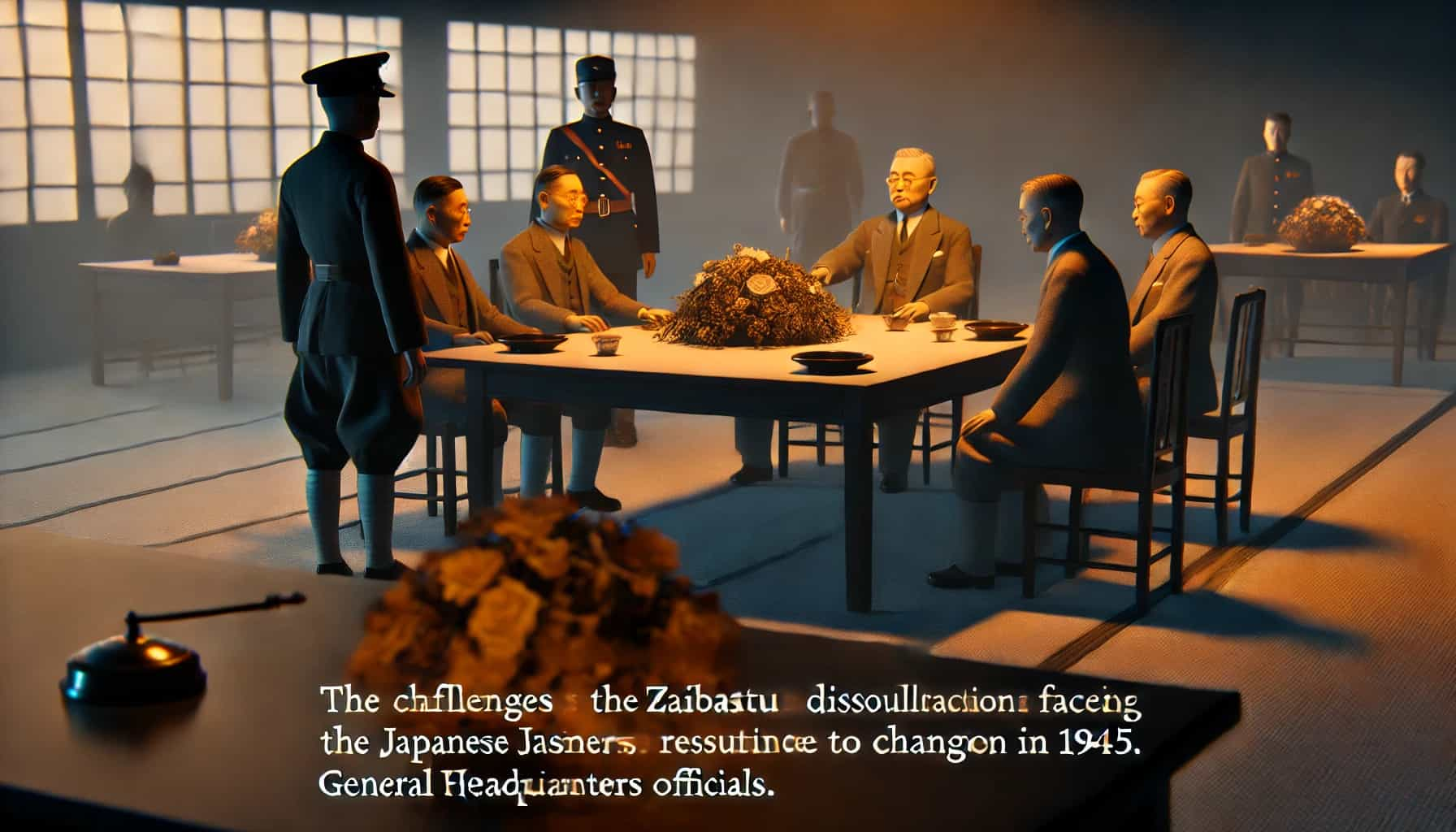GHQ's Post-War Zaibatsu Dissolution in 1945
The theme of this English language resource is "learning casual English through real events."
The theme of this English resource is "Learn casual English through real events."
Section 1: The Beginning of Zaibatsu Dissolution
On November 6, 1945 shortly after The end of World War II, the General Headquarters (GHQ) began the dissolution of Japan's zaibatsu. The dissolution was part of GHQ's reforms to decentralize economic power in Japan and create a more democratic society. The dissolution was part of GHQ's reforms to decentralize economic power in Japan and create a more democratic society.
Q1: When did GHQ begin the dissolution of the zaibatsu?
Sample Answer:. GHQ began the dissolution of the zaibatsu on November 6, 1945.
Q2: What were zaibatsu?
Sample Answer:. Zaibatsu were large family-owned business conglomerates that had significant influence over the Japanese economy.
Q3: Why did GHQ dissolve the zaibatsu?
Sample Answer:. GHQ dissolved the zaibatsu to decentralize economic power in Japan and promote a more democratic society.
Now, let's talk using idioms.
Let the students choose one favorite idiom and make an example sentence.
Idiom Explanation:. "Shortly after".
Shortly after means a short time after something happens.
Example Sentence: GHQ began the dissolution of the zaibatsu shortly after the end of World War II.
Section 1: The Beginning of Zaibatsu Dismantling
On November 6, 1945, immediately after the end of World War II, the General Headquarters of the Allied Forces (GHQ) began dismantling Japanese zaibatsu. Zaibatsu were large family-run business conglomerates that had a significant impact on the Japanese economy. The dismantling of zaibatsu was part of GHQ's reforms to decentralize Japan's economic power and create a more democratic society.
Q1: When did GHQ begin dismantling zaibatsu?
Sample Responses:. GHQ began dismantling zaibatsu on November 6, 1945.
Q2: What is a zaibatsu?
Sample Responses:. Zaibatsu are large family-owned business conglomerates that have a significant impact on the Japanese economy.
Q3: Why did GHQ break up the zaibatsu?
Sample Responses:. GHQ dismantled zaibatsu in order to decentralize Japan's economic power and promote a more democratic society.
Idioms Explained:. "Shortly after".
Shortly after means a short period of time immediately after something has happened.
Example Sentences:. GHQ began dismantling zaibatsu immediately after the end of World War II.
Section 2: The Challenges of Zaibatsu Dissolution


The dissolution of the zaibatsu was not a simple process. deep roots GHQ faced resistance from business leaders, and the process required significant restructuring of companies. However, the determination of GHQ and the support from reform-minded Japanese officials ensured the dissolution moved forward.
Q1: Why was the dissolution of the zaibatsu challenging?
Sample Answer:. The dissolution was challenging because many zaibatsu were deeply rooted in the Japanese economy and resistant to change.
Q2: Who resisted the dissolution efforts?
Sample Answer:. Business leaders resisted the dissolution efforts.
Q3: What helped GHQ move the dissolution process forward?
Sample Answer:. GHQ's determination and the support of reform-minded Japanese officials helped move the process forward.
Now, let's talk using idioms.
Let the students choose one favorite idiom and make an example sentence.
Idiom Explanation:. "Deep roots".
Deep roots means having a strong, established connection or influence in something.
Example Sentence: Many zaibatsu had deep roots in the Japanese economy, making the dissolution challenging.
Section 2: Challenges of Dismantling Zaibatsu
Dismantling the zaibatsu was not an easy process. Many zaibatsu were deeply entrenched in the Japanese economy and resistant to change, and GHQ faced resistance from corporate leaders, necessitating a major reorganization of the companies. However, with the determination of GHQ and the support of the reform-minded Japanese bureaucracy, the dismantling moved forward.
Q1: Why was it so difficult to dismantle the zaibatsu?
Sample Responses:. Dismantling was difficult because many zaibatsu were deeply entrenched in the Japanese economy and resistant to change.
Q2: Who resisted your demolition efforts?
Sample Responses:. Company leaders resisted demolition efforts.
Q3: What helped GHQ move forward with the dismantling process?
Sample Responses:. The determination of GHQ and the support of the reform-minded Japanese bureaucracy helped move the process along.
Idioms Explained:. "Deeply rooted."
take root deeply in means having a strong, established connection or influence on something.
Example Sentences:. Many zaibatsu were deeply entrenched in the Japanese economy, making their dismantling difficult.
Section 3: The Impact of the Zaibatsu Dissolution

The dissolution of the zaibatsu had a profound impact on Japan's economy and society. It broke up the concentration of economic power and allowed for more competition among businesses. paved the way The dissolution was a key step in reshaping Japan's post-war economy. The dissolution was a key step in reshaping Japan's post-war economy.
Q1: What was the impact of the zaibatsu dissolution on Japan's economy?
Sample Answer:. It broke up the concentration of economic power and allowed for more competition among businesses.
Q2: How did the dissolution contribute to economic democratization?
Sample Answer:. The dissolution paved the way for Japan's economic democratization and the growth of small and medium-sized enterprises.
Q3: What role did the zaibatsu dissolution play in reshaping Japan's economy?
Sample Answer:. The dissolution was a key step in reshaping Japan's post-war economy.
Now, let's talk using idioms.
Let the students choose one favorite idiom and make an example sentence.
Idiom Explanation:. "Paved the way".
Paved the way means to create a situation in which something can happen or develop more easily.
Example Sentence: The zaibatsu dissolution paved the way for economic democratization in Japan.
Section 3: Impact of the Dissolution of the Zaibatsu
The dismantling of the zaibatsu had a profound impact on the Japanese economy and society. It dismantled the concentration of economic power and promoted competition among firms. This reform paved the way for Japan's economic democratization and ultimately contributed to the rapid growth of small and medium-sized enterprises. The dismantling of the zaibatsu was an important step in rebuilding the postwar Japanese economy.
Q1: How did the dissolution of the zaibatsu affect the Japanese economy?
Sample Responses:. It dismantled the concentration of economic power and promoted competition among firms.
Q2: How has demolition contributed to democratizing the economy?
Sample Responses:. Demolition paved the way for Japan's economic democratization and contributed to the growth of small businesses.
Q3: What role did the dissolution of zaibatsu play in Japan's economic restructuring?
Sample Responses:. The demolition was an important step in rebuilding the postwar Japanese economy.
Idioms Explained:. "I paved the way."
Paved the way. means to create a situation in which something happens or develops more easily.
Example Sentences:. The dismantling of zaibatsu paved the way for Japan's economic democratization.






